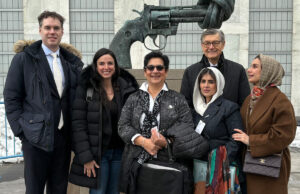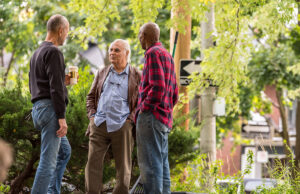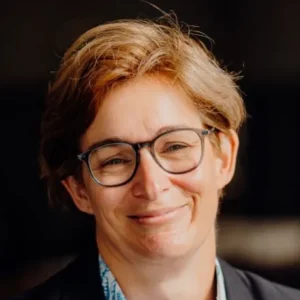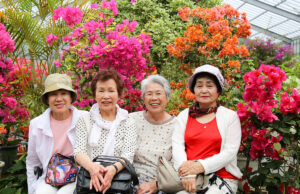The 11th Annual Briefing AARP-UN Series: “Taking a Different Course for a World Free Of Poverty”
By Shannon Davis
AARP International hosted the 11th Annual Briefing Series at the United Nations on Jan. 30, 2018. The series entitled, “Taking a Different Course for a World Free of Poverty,” was held during the 56th session of the UN Commission for Social Development (CSocD56).
The briefing focused on poverty eradication among a diverse platform of stakeholders, including representatives from various governments, international public and private organizations, and United Nations entities to undertake a policy dialogue on experiences and innovative programs in poverty eradication efforts designed for older persons.
The opening session heard remarks from Liu Zhenmin, United Nations Under-Secretary-General for Economic and Social Affairs that supports the General Assembly’s Open-ended Working Group. Mr. Liu Zhenmin highlighted the Commission for Social Development’s ongoing effort to include older persons. More specifically, he announced the development of the Focal Point on Ageing, an informal network of interested entities of the UN system that was recently launched by his department and focused on promoting the engagement of older persons in the implementation of the 2030 Agenda for Sustainable Development.
In his keynote address, Lance Robertson, Assistant Secretary for Aging, and Administration for Community Living at the Department of Health and Human Services, US Government, discussed the importance of Social Security and Medicare in fighting poverty. He stated that “Aging is not a niche issue. It is a unified common experience.”
At the core of the discussion was the idea that poverty is a multi-faceted issue. When discussing poverty, we must address the inequalities older people face as a result of income insecurity, access to health services, lack of education, and transportation and accessible housing arrangements.
Others discussed the absence of social protection systems that have gravely affected the living situations of older people and has created a negative impact resulting in an ever-increasing number of older people living in poverty and creating an expensive burden for individuals, families, government, and society.
While some pension programs constitute a stable income and effective means of reducing poverty in old age, only 68% of people above retirement age collected a pension in 2016[1]. Although some governments in developing countries have extended social services coverage in developing countries, they must do more to ensure that older people have equal access to adequate social protection systems and services while mainstreaming ageing into national and local poverty reduction plans, strategies, and programs.
Further, attendees addressed the risk of poverty increases with age, as older people find it harder to work. As people are living longer and the cost of living is continuously rising, many older people do not have the economic security to sustain them as they get older. They are in greater need of long-term care and other medical and social services.
Lisa Marsh-Ryerson, President of the AARP Foundation, stressed the importance of ensuring that older people had access to jobs and stated that, “access to lifetime education is essential to fight poverty.” Older people face not only age-related poverty but also age discrimination because of a general lack of understanding and awareness. Mrs. Marsh-Ryerson suggested that we partner with employers to continually train older people and extinguish age discrimination and exclusion that limits their opportunities in society. Further, she encouraged stakeholders to examine the role of technology and its impact on an ageing workforce.
Mrs. Marsh-Ryerson stated, “We must design tools for older people that are fighting against memory and vision loss, decreased mobility and functionality, and a technological skills learning gap, to remain competitive in the workforce.”
Data collection mechanisms among the older population are sorely lacking and often data is not collected for people 50 and over. This makes it difficult to document and address patterns of age discrimination, thereby leading to a lack of understanding and a failure to include older people in the development of policies and interventions.
José António Vieira da Silva, the Minister of Labour, Solidarity, and Social Security of the Portuguese Republic encouraged us to advocate “to bring data aggregation out of the shadows”. We do not have the data at the national or international level to fully understand the challenges that older people face and the support they need.
Rosemary Kalapurakal, Lead Advisor of the Sustainable Development Cluster (Inclusive Growth) at the United Nations, stated “the challenge for us is to recognize that if we want to do effective work within the United Nations, we need to have data on ageing” and to encourage UN agencies, governments, donors, and communities to commit to incorporating older women and men in data collection mechanisms. These mechanisms must be disaggregate for sex, age group, and disability to remove barriers of discrimination and protect the right and dignity of older people.
The session ended with Rosemary Lane stating that “it is our collective responsibility to advocate for the people that are not as lucky as we are,” and to work together to eradicate poverty among older persons. The series is just one of the major events that occur during 56th Commission for Social Development which focuses on incorporating older people as a sustainable development goal.
[1] International Labour Office, World Social Protection Report 2017–19: Universal social protection to achieve the Sustainable Development Goals. Available from http://www.ilo.org/wcmsp5/groups/public/—dgreports/—dcomm/—publ/documents/publication/wcms_604882.pdf
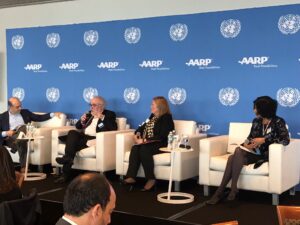
Recently Added
February 19, 2026
Statement to the United Nations: February 2026
January 22, 2026

